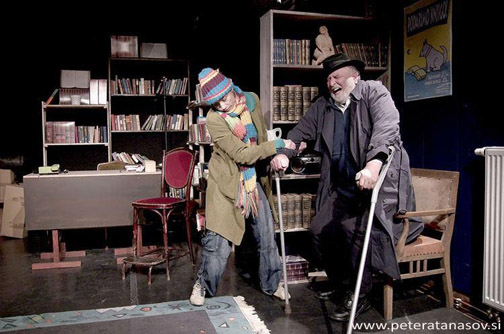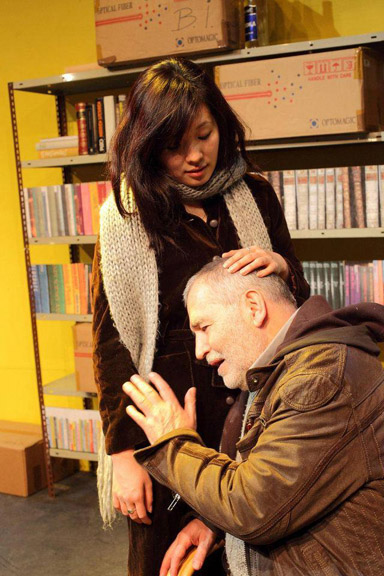Take Me in Your Hands
from Collected Plays II

Take Me in Your Hands, Slovenian Chamber Theatre, 2012
Praise for Take Me in Your Hands
Excerpt from the foreword written by Dr. Ossama el-Kaffash for the publication of the play in Arabic:
Evald Flisar’s drama Take Me in Your Hands is a story of life and learning, of love and sacrifice, of hope, despair and death, as well as of the end of an important period in man’s recent history. It is neither comedy nor tragedy, but rather a Flisaresque tragicomedy, the label attached to most of his plays by Slovene critic and theorist Blaž Lukan. In this play, too – perhaps in this one particularly – Flisar builds his theater on the classical role of the actor. Visual elements do not have an important role and are certainly not extravagant or spectacular. Without exception, Flisar’s characters are established and develop through dialogue. And it is dialogue that is the most intriguing aspect of his dramatic writing: it is quick, sensitive, subtly informative, entertaining and in parts so imbued with hidden meanings that only the smartest can keep up with it. It is never declarative, things and feelings are never named directly: what is really taking place among the figures on the stage is always hidden behind and between the words.

Take Me in Your Hands, Theater im Keller, Graz, Austria, 2011
In Take Me in Your Hands the two protagonists exchange their relative “knowledge” and learn from each other. In so doing they reach a higher level of awareness: of life and love but, above all, of who and what they are in reality or in relation to each other (which becomes their primary Truth the moment it is established). All the contemporary forms of modern psychology, psychoanalysis, psychotherapy and related kinds of “understanding and healing the soul” emphasize the significance of knowing oneself or looking into oneself, and in Flisar’s play we can describe the journey toward this end as striving for the classical theatrical function of catharsis… The deconstruction of myths is perhaps the main characteristic of Flisar’s dramatic writing and he almost always pulls this off with masterful ease. Take Me in Your Hands deconstructs the myth of wisdom supposedly brought by age. On another level it reconstructs that myth as self-awareness. This is achieved by deconstructing the myth of the irresponsibility of youth, which is a mirror image of the “wisdom that comes with years.” By entrusting his fate to his pupil/assistant Maya and her intuition, the father figure Iztok transcends his own suffering and accepts death as well as life, and along with this Maya’s “youthful wisdom” (the wisdom that arises from the need to survive).

Evald Flisar (1945, Slovenia). Novelist, short story writer, playwright, essayist, editor. Studied comparative literature in Ljubljana, English literature in London, psychology in Australia. Globe-trotter (travelled in more than 80 countries), underground train driver in Sydney, Australia, editor of (among other things) an encyclopaedia of science and invention in London, author of short stories and radio plays for the BBC, president of the Slovene Writers’ Association (1995 – 2002), since 1998 editor of the oldest Slovenian literary journal Sodobnost (Contemporary Review). Author of eleven novels (six short-listed for kresnik, the Slovenian “Booker”), two collections of short stories, three travelogues (regarded as the best of Slovenian travel writing), two books for children and teenagers (shortlisted for Best Children’s Book Award) and thirteen stage plays (six nominated for Best Play of the Year Award, twice won the award). Winner of the Prešeren Foundation Prize, the highest state award for prose and drama. Various works, especially short stories and plays, translated into 32 languages, among them Bengali, Hindi, Malay, Nepali, Indonesian, Turkish, Greek, Japanese, Chinese, Arabic, Polish, Czech, Albanian, Lithuanian, Icelandic, Russian, Italian, Spanish etc. Stage plays regularly performed all over the world, most recently in Austria, Egypt, India, Indonesia, Japan, Taiwan, Nepal, Bosnia & Herzegovina, Bulgaria and Belarus. Attended more than 50 literary readings and festivals on all continents. Lived abroad for 20 years (three years in Australia, 17 years in London). Since 1990, resident in Ljubljana, Slovenia.
|
|

